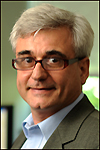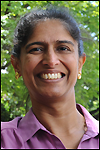Four engineering professors received newly endowed chairs in late 2011, bringing the total of named chairs in the School of Engineering to 12.
The recipients are Benoit Dawant and David Kosson, both named a Cornelius Vanderbilt Professor of Engineering. Anita Mahadevan-Jansen is the Orrin H. Ingram Professor of Biomedical Engineering. Sankaran Mahadevan is the John R. Murray Sr. Professor of Engineering.
“Endowed faculty chairs are essential to building a world-class faculty, and tremendously important for acknowledging faculty achievement and distinction,” said Dean Kenneth F. Galloway.
The Cornelius Vanderbilt chairs were made possible through a university initiative announced in 2010 to create 60 new endowed faculty chairs over the next two years.

Benoit Dawant, professor in the department of electrical engineering and computer science, works at the interface between engineering and medicine. He develops techniques that permit the automatic analysis of medical images and their use for surgical guidance.
He is currently working with colleagues on systems that assist in the placement of deep brain stimulator used to treat Parkinson’s disease and other movement disorders, in the placement cochlear implants, in the resection of tumors, in liver surgery, or in the localization of radio-sensitive structures for radiation therapy.
Dawant received his M.S. degree in electrical and computer engineering from the Universite Catholique de Louvain, Belgium; and a Ph.D. degree in electrical and computer engineering in 1987 from the University of Houston. He joined Vanderbilt University in 1988.
Dawant is a Fellow of the Institute of Electrical and Electronics Engineers and he is the author or the co-author of more than 70 scientific journal papers, which have been cited more than 2,000 times.

David S. Kosson, professor and chair of Civil and Environmental Engineering,is an internationally recognized expert in safe and environmentally responsible management of large volume wastes and highly hazardous materials.
Kosson is co-principal investigator of the Vanderbilt-led Consortium for Risk Evaluation with Stakeholder Participation (CRESP), a multi-university program working with the Department of Energy, regulators and other stakeholders to advance cost-effective, risk-informed cleanup of the nation’s former nuclear weapons production sites and potential future used nuclear fuel storage and waste disposal sites.
For almost two decades, through the National Research Council of the National Academies, Kosson has advised the Department of Defense on safe disposal of chemical weapons, as required by international treaty, The Chemical Weapons Convention.
Kosson received his B.S., M.S. and Ph.D. degrees in chemical and biochemical engineering from Rutgers, The State University of New Jersey. He joined Vanderbilt University in 2000.

Sankaran Mahadevan, professor of civil and environmental engineering, works on ways to increase the reliability and decrease the risks of complex structures and systems. The family of John Rylen Murray Sr. established the Murray chair in the School of Engineering in his honor. John Murray was a longtime pertroleum engineer, a resident of Houston, Texas, and a trustee for the H. Fort Flowers Foundation.
His research regarding automotive, aircraft and spacecraft systems, civil infrastructure systems and nuclear waste storage has the potential to save human lives and millions of dollars. His research has been funded by NSF, NASA, FAA, U. S. Department of Energy, U. S. Department of Transportation, Nuclear Regulatory Commission, U. S. Army Research Office, U.S. Air Force, U. S. Army Corps of Engineers, General Motors, Chrysler, Union Pacific, Transportation Technology Center, and the Sandia, Los Alamos, Idaho and Oak Ridge national laboratories.
Mahadevan also directs the Vanderbilt Risk and Reliability Engineering and Management doctoral program, the largest and most prestigious of its kind in the world.
Mahadevan joined the Vanderbilt engineering faculty in 1988, after earning his Ph.D. from Georgia Tech. He has authored more than 300 technical publications, including two textbooks and 130 peer-reviewed journal articles.
His work has been recognized with numerous awards, including the Distinguished Probabilistic Methods Educator Award from the Society of Automotive Engineers, the Next Generation Design Tools Award from NASA, and the Joe B. Wyatt Distinguished University Professor Award from Vanderbilt.

Anita Mahadevan-Jansen is the recipient of the Orrin H. Ingram chair in biomedical engineering. The Ingram family has an association with Vanderbilt that is approaching 50-years in duration. Orrin H. Ingram served on the Board of Trust from 1952 to 1963.
Mahadevan-Jansen develops applications of optical techniques for diagnosis of pathology. Her primary research – in Vanderbilt’s Biomedical Photonics Laboratory – investigates the applications of optical spectroscopies and imaging for cancer diagnosis and guidance of therapy. For example, Mahadevan-Jansen discovered a unique, natural fluorescent signature to parathyroid glands, which allows a simple and reliable optical detector to positively identify the glands during endocrine surgery. The discovery was reported in the July 2011 issue of the Journal of Biomedical Optics.
The Biomedical Photonics Lab has pioneered the application of pulsed infrared lasers for the activation of neural tissues in a damage-free, artifact-free, contact-free way. Based on this discovery, she has ongoing projects focused on infrared neural stimulation. These projects span from the fundamental discovery of what makes INS work to the clinical translation of this technique in human nerves in vivo.
She received her bachelor’s and master’s degrees in physics from the University of Bombay, India; a master’s and Ph.D. degrees in biomedical engineering from the University of Texas-Austin. She joined the Vanderbilt engineering faculty as an assistant professor in 1998.
She is an associate editor of the Journal of Biomedical Optics and has served as a reviewer of more than 20 journals, and served as chair of more than 20 professional conferences, and authored over 75 peer-reviewed publications and presented over 175 abstracts and conference presentations.
Mahadevan-Jansen is a fellow of the American Institute of Medical and Biological Engineering (AIMBE), the American Society for Laser Medicine and Surgery (ASLMS), and the International Society for Optical Engineering (SPIE). She is the recipient of a Chancellor’s Research Award at Vanderbilt.